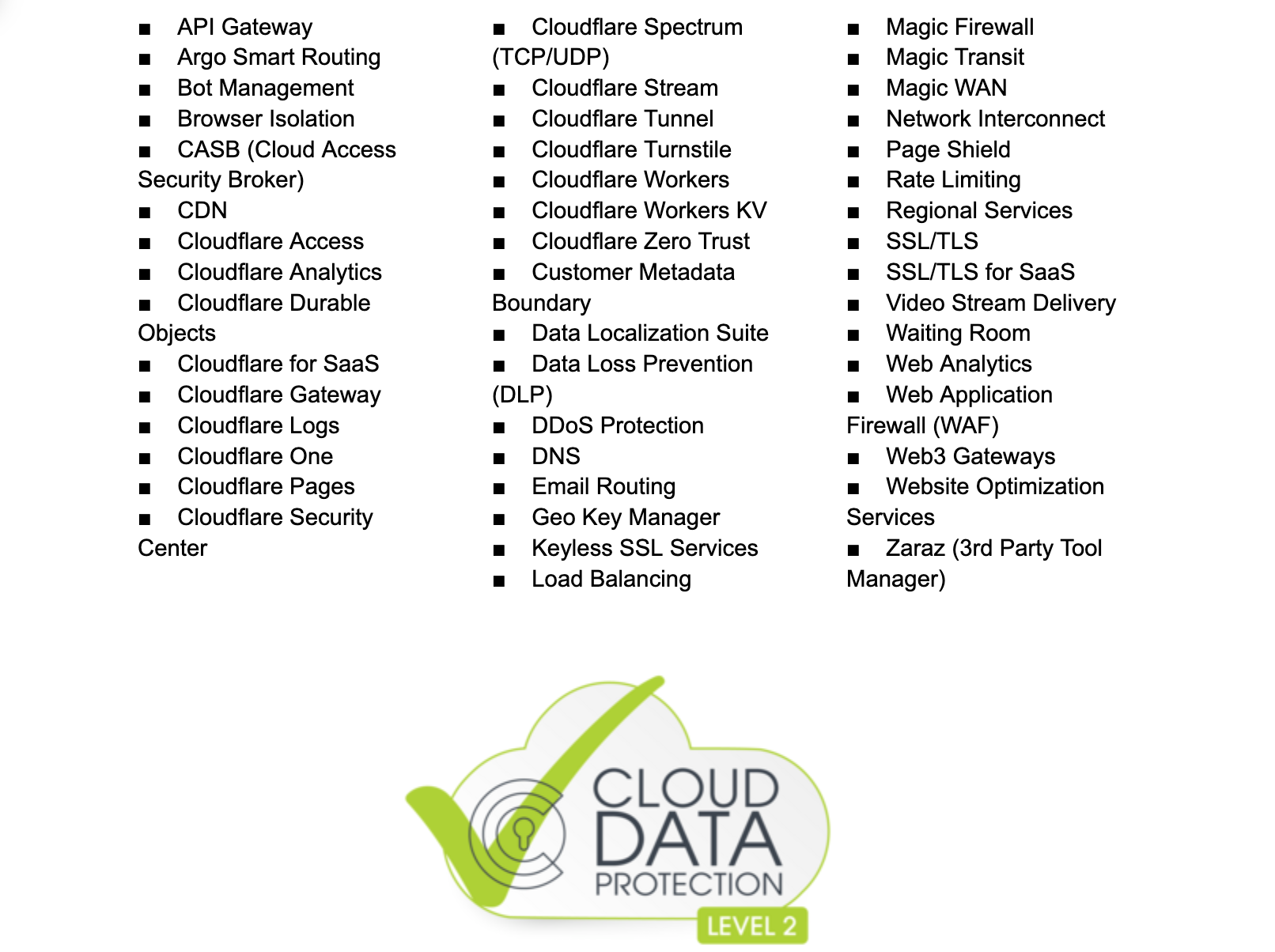
Cloudflare has achieved a new EU Cloud Code of Conduct privacy validation, demonstrating GDPR compliance to strengthen trust in cloud services
Internet privacy laws around the globe differ, and in recent years there’s been much written about cross-border data transfers. Many regulations require adequate protections to be in place before personal information flows around the world, as with the European General Data Protection Regulation (GDPR). The law rightly sets a high bar for how organizations must carefully handle personal information, and in drafting the regulation lawmakers anticipated personal data crossing-borders: Chapter V of the regulation covers those transfers specifically.
Whilst transparency on where personal information is stored is important, it’s also critically important how personal information is handled, and how it is kept safe and secure. At Cloudflare, we believe in protecting the privacy of personal information across the world, and we give our customers the tools and the choice on how and where to process their data. Put simply, we require that data is handled and protected in the same, secure, and careful way, whether our customers choose to transfer data across the world, or for it to remain in one country.
And today we are proud to announce that we have successfully completed our assessment journey and received the EU Cloud Code of Conduct compliance mark as a demonstration of our compliance with the GDPR, protecting personal data in the cloud, all across the world.
It matters how personal information is handled – not just where in the world it is saved
The same GDPR lawmakers also anticipated that organizations would want to handle and protect personal information in a consistent, transparent, and safe way too. Article 40, called ‘Codes of Conduct’ starts:
“The Member States, the supervisory authorities, the Board and the Commission shall encourage the drawing up of codes of conduct intended to contribute to the proper application of this Regulation, taking account of the specific features of the various processing sectors and the specific needs of micro, small and medium-sized enterprises.”
Using codes of conduct to demonstrate compliance with privacy law has a longer history, too. Like the GDPR, the pioneering 1995 EU Data Protection Directive, officially Directive 95/46/EC, also included provision for draft community codes to be submitted to national authorities, and for those codes to be formally approved by an official body of the European Union.
An official GDPR Code of Conduct
It took a full five years after the GDPR was adopted in 2016 for the first code of conduct to be officially approved. Finally in May 2021, the European Data Protection Board, a group composed of representatives of all the national data protection authorities across the union, approved the “EU Data Protection Code of Conduct for Cloud Service Providers” – the EU Cloud Code of Conduct (or ‘EU Cloud CoC’ for short) as the first official GDPR code of conduct. The EU Cloud CoC was brought to the board by the Belgian supervisory authority on behalf of SCOPE Europe, the organization who collaborated to develop the code over a number of years, including with input from the European Commission, members of the cloud computing community, and European data protection authorities.
The code is a framework for buyers and providers of cloud services. Buyers can understand in a straightforward way how a provider of cloud services will handle personal information. Providers of cloud services undergo an independent assessment to demonstrate to the buyers of their cloud services that they will handle personal information in a safe and codified way. In the case of the EU Cloud CoC and only because the code has received formal approval, buyers of cloud services compliant with code will know that the cloud provider handled customer personal information in a way that is compliant with the GDPR.
What the code covers
The code defines clear requirements for providers of cloud services to implement Article 28 of the GDPR (“Processor”) and related articles. The framework covers data protection policies, as well as technical and organizational security measures. There are sections covering providers’ terms and conditions, confidentiality and recordkeeping, the audit rights of the customer, how to handle potential data breaches, and how the provider approaches subprocessing – when a third-party is subcontracted to process personal data alongside the main data processor – and more.
The framework also covers how personal data may be legitimately transferred internationally, although whilst the EU Cloud CoC covers ensuring this is done in a legally-compliant way, the code itself is not a ‘safeguard’ or a tool for third country transfers. A future update to the code may expand into that with an additional module, but as of March 2023 that is still under development.
Let us do a deeper dive into some of the requirements of the EU Cloud CoC and how it can demonstrate compliance with the GDPR
Example one
One requirement in the code is to have documented procedures in place to assist customers with their ‘data protection impact assessments’. According to the GDPR, these are:
“…an assessment of the impact of the envisaged processing operations
on the protection of personal data.” – Article 35.1, GDPR
So a cloud service provider should have a written process in place to support customers as they undertake their own assessments. In supporting the customer, the service provider is demonstrating their commitment to the rigorous data protection standards of the GDPR too. Cloudflare meets this requirement, and further supports transparency by publishing details of sub-processors used in the processing of personal data, and directing customers to audit reports available in the Cloudflare dashboard.
There’s also another reference in the GDPR to codes of conduct in the context of data protection impact assessments too:
“Compliance with approved codes of conduct… shall be taken into due account in assessing the impact of the processing operations performed… in particular for the purposes of a data protection impact assessment.” – Article 35.8, GDPR
So when preparing an impact assessment, a cloud customer shall take into account that a service provider complies with an approved code of conduct. Another way that both customers and cloud providers benefit from using codes of conduct!
Example two
Another example of a requirement of the code is that when cloud service providers provide encryption capabilities, they shall be implemented effectively. The requirement clarifies further that this should be undertaken by following strong and trusted encryption techniques, by taking into account the state-of-the-art, and by adequately preventing abusive access to customer personal data. Encryption is critical to protecting personal data in the cloud; without encryption, or with weakened or outdated encryption, privacy and security are not possible. So in using and reviewing encryption appropriately, cloud services providers help meet the requirements of the GDPR in protecting their customers’ personal data.
At Cloudflare, we are particularly proud of our track record: we make effective encryption available, for free, to all our customers. We help our customers understand encryption, and most importantly, we use strong and trusted encryption algorithms and techniques ourselves to protect customer personal data. We have a formal Research Team, including academic researchers and cryptographers who design and deploy state-of-the-art encryption protocols designed to provide effective protection against active and passive attacks, including with resources known to be available to public authorities; and we use trustworthy public-key certification authorities and infrastructure. Most recently this month, we announced that post-quantum crypto should be free, and so we are including it for free, forever.
More information
The code contains requirements described in 87 statements, called controls. You can find more about the EU Cloud CoC, download a full copy of the code, and keep up to date with news at https://eucoc.cloud/en/home
Why this matters to Cloudflare customers
Cloudflare joined the EU Cloud Code of Conduct’s General Assembly last May. Members of the General Assembly undertake an assessment journey which includes declaring named cloud services compliant with the EU Cloud Code, and after completing an independent assessment process by SCOPE Europe, the accredited monitoring body, receive the EU Cloud Code of Conduct compliance mark.
Cloudflare has completed the assessment process and been verified for 47 cloud services.
Cloudflare services that are in scope for EU Cloud Code of Conduct:
 EU Cloud CoC Verification-ID: 2023LVL02SCOPE4316.
EU Cloud CoC Verification-ID: 2023LVL02SCOPE4316.
Services are verified compliant with the EU Cloud Code of Conduct,
Verification-ID: 2023LVL02SCOPE4316.
For further information please visit https://eucoc.cloud/en/public-register
And we’re not done yet…
The EU Cloud Code of Conduct is the newest privacy validation to add to our growing list of privacy certifications. Two years ago, Cloudflare was one of the first organisations in our industry to have received the new ISO privacy certification, ISO/IEC 27701:2019, and the first Internet performance & security company to be certified to it. Last year, Cloudflare certified to a second international privacy standard related to the processing of personal data, ISO/IEC 27018:2019. Most recently, in January this year Cloudflare completed our annual ISO audit with third-party auditor Schellman; and our new certificate, covering ISO 27001:2013, ISO 27018:2019, and ISO 27701:2019 is now available for customers to download from the Cloudflare dashboard.
And there’s more to come! As we blogged about in January for Data Privacy Day, we’re following the progress of the emerging Global Cross Border Privacy Rules (CBPR) certification with interest. This proposed single global certification could suffice for participating companies to safely transfer personal data between participating countries worldwide, and having already been supported by several governments from North America and Asia, looks very promising in this regard.
Cloudflare certifications
Find out how existing customers may download a copy of Cloudflare’s certifications and reports from the Cloudflare dashboard; new customers may also request these from your sales representative.
For the latest information about our certifications and reports, please visit our Trust Hub.
Source: cloudflare.com



